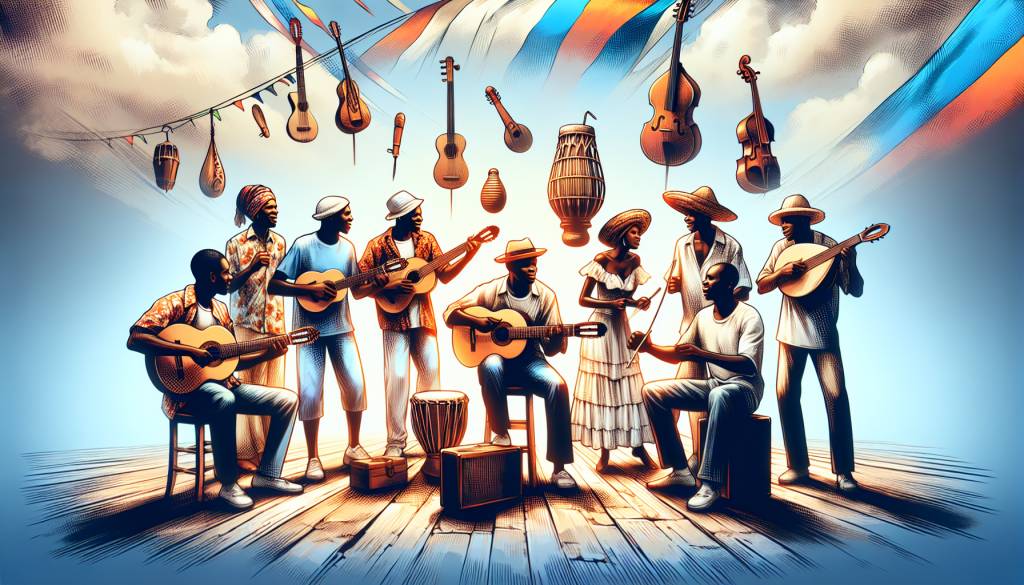Exploring the Rhythmic Heart of the Caribbean: Martinique’s Musical Heritage
Martinique, the flower of the Caribbean, is not just a haven of exquisite beaches and lush landscapes but also a melting pot of culture and music. The island’s history is rich with African, European, and indigenous influences that have shaped its unique sonic tapestry. With genres ranging from the pulsating zouk to the traditional chouval bwa, Martinique’s music scene is a thrilling exploration of rhythm and soul.
Zouk: The Beat That Travels Beyond Borders
If one were to choose a soundtrack for the Caribbean, zouk music would be a top contender. Originating in the 1980s, zouk has become synonymous with Martinique and its sister island, Guadeloupe. This up-tempo style of music combines elements from compas, cadence-lypso, and traditional African and Caribbean rhythms. Famous for its sensual dance moves, zouk remains a powerful cultural emblem for Martinique and has spread its infectious beat across the globe.
The Roots and Rise of Chouval Bwa
While zouk may enjoy international acclaim, chouval bwa is a music form that is steeped in Martinique’s history and tradition. This genre—whose name translates to « wooden horse »—draws from the island’s agrarian past and is deeply entwined with its annual carnival celebrations. Chouval bwa music accompanies a dance and procession around a ‘manège’, a carousel that’s powered by people instead of electricity. Musicians use bamboo flutes, tanbou drums, and accordions to create a lively and community-focused atmosphere.
The Influence of Biguine in Martiniquan Music
Another cornerstone of Martiniquan music is the biguine, which emerged in the late 19th century. With its origins tied to the slave and post-slavery period, biguine reflects a blend of French ballroom dance music with African rhythms. Initially a form of resistance and self-expression for the island’s Afro-Caribbean population, biguine has evolved to become a symbol of Martinican identity and pride. Its pulsing rhythms and melancholic melodies continue to inspire contemporary musicians and attract music lovers from around the world.
Mazurka and Quadrille: A European Twist to Island Sounds
Not all Caribbean music is born from African roots; the mazurka and quadrille are perfect examples of how European styles have influenced Martinique’s soundscape. These ballroom dances, brought to the island by French colonists, have been adapted over time to incorporate a Caribbean flair. The mazurka in Martinique is often played with a faster tempo, while the quadrille’s choreography has been infused with local gestures and steps, showcasing the island’s flair for innovation and cultural fusion.
Modern Music in Martinique: A Blend of Traditional and Contemporary
Contemporary music in Martinique is a reflection of its diverse cultural makeup. Today’s artists often weave together elements from traditional genres with modern influences, such as hip-hop, reggae, and R&B. Bands and singers like Kassav’, the group credited with creating zouk, continue to push musical boundaries and maintain the island’s reputation as a hotspot for innovative Caribbean music.
Popular Music Festivals and Events in Martinique
The best way to experience the vivacious music of Martinique is to dive into its vibrant festival scene. Events such as the Martinique Jazz Festival and the cultural celebrations of Carnival are just a few occasions where one can witness the dizzying array of island sounds. These gatherings are not just about entertainment; they’re a celebration of Martinican heritage, bringing together the young and the old in a shared love for their musical legacy.
How Music Reflects the Social Fabric of Martinique
Music in Martinique transcends mere enjoyment; it is a narrative of the island’s social history. Traditional music, with its storytelling, often sheds light on the struggles and triumphs of Martinican society. Whether it’s the reflective notes of biguine or the protest lyrics found in some reggae tracks, the music of Martinique acts as an audible diary of its community’s journey through time.
Preserving the Musical Traditions of Martinique
Martinique’s commitment to preserving its musical heritage is evident in the various cultural initiatives and educational programs on the island. Institutions and local communities work together to ensure that the traditional sounds of zouk, chouval bwa, biguine, and others are passed down to new generations, preserving their unique character and storied origins. The island’s music is not only a source of entertainment but a living, breathing chronicle of its past, present, and future.
Conclusion
The music of Martinique is as diverse and vibrant as its landscape, a testament to the island’s rich cultural tapestry. From the energetic beats of zouk to the traditional rhythms of chouval bwa, music is an essential part of Martinique’s soul. It tells the story of its people, echoes their history, and continues to shape their identity in the Caribbean and beyond. As the world tunes in to the island’s beats, Martinique proudly dances to its own rhythm, inviting everyone to join in its musical journey.




